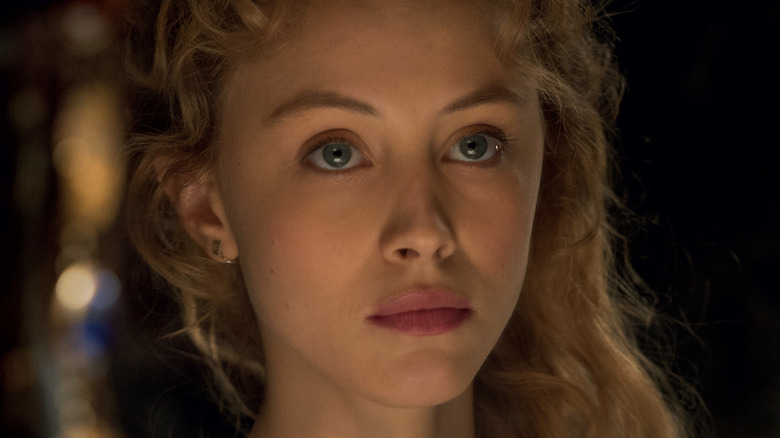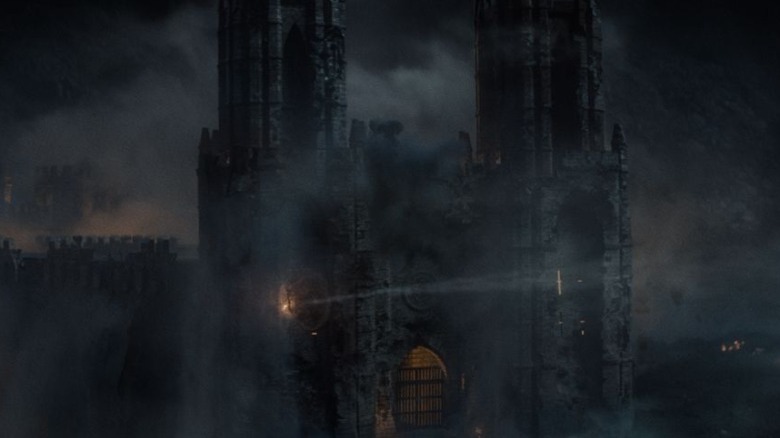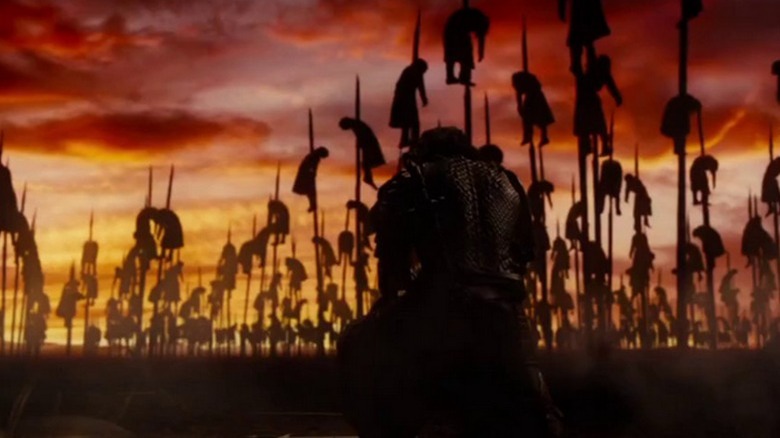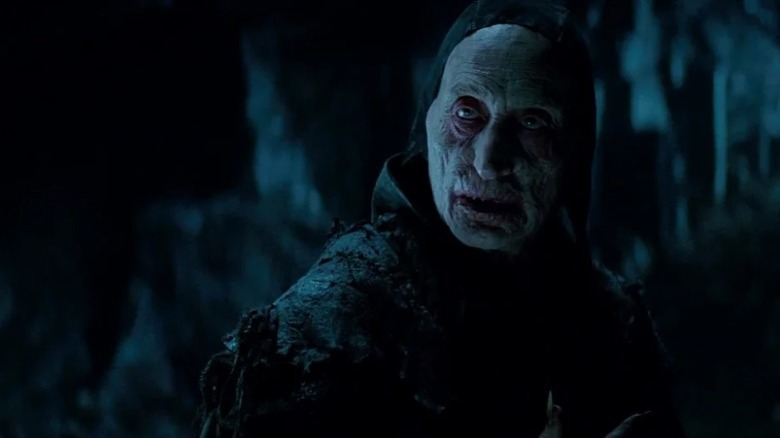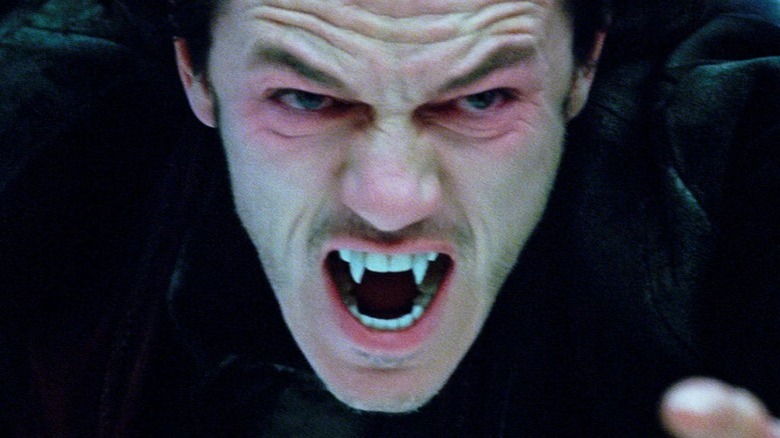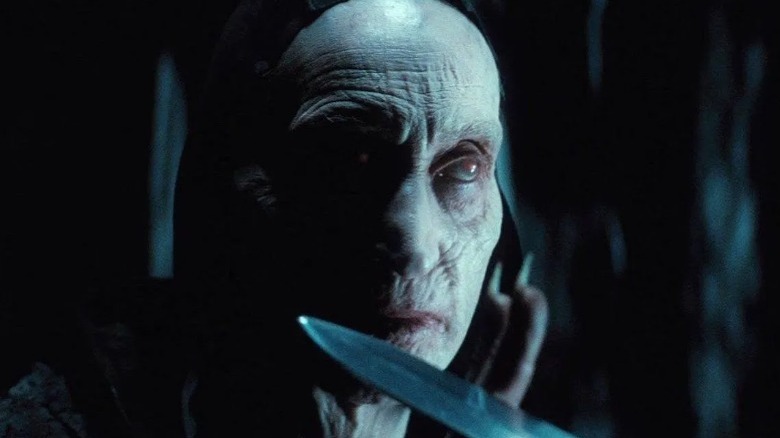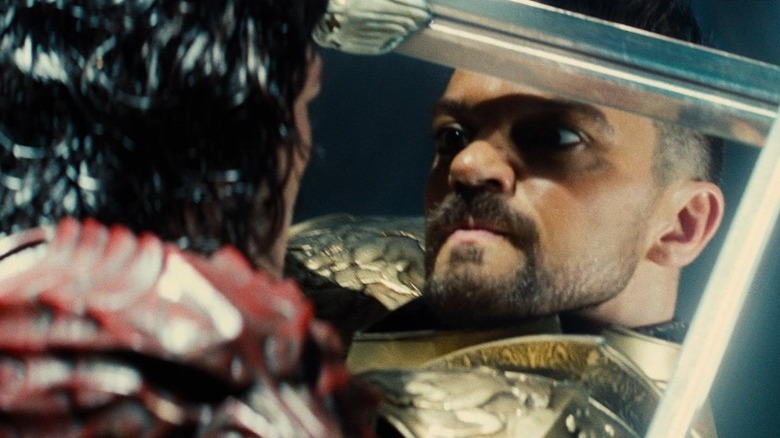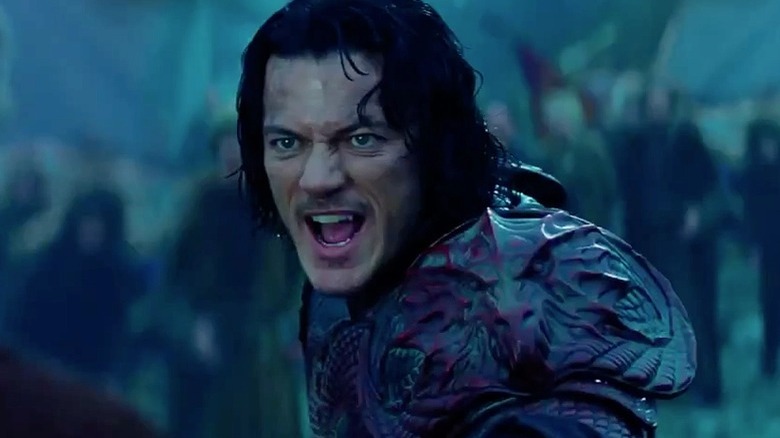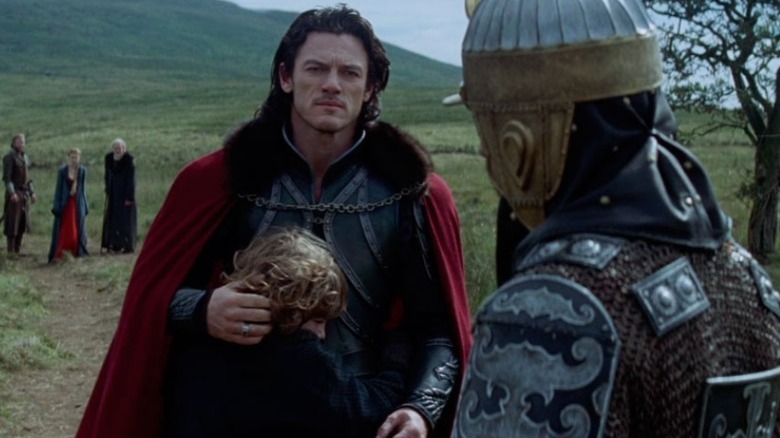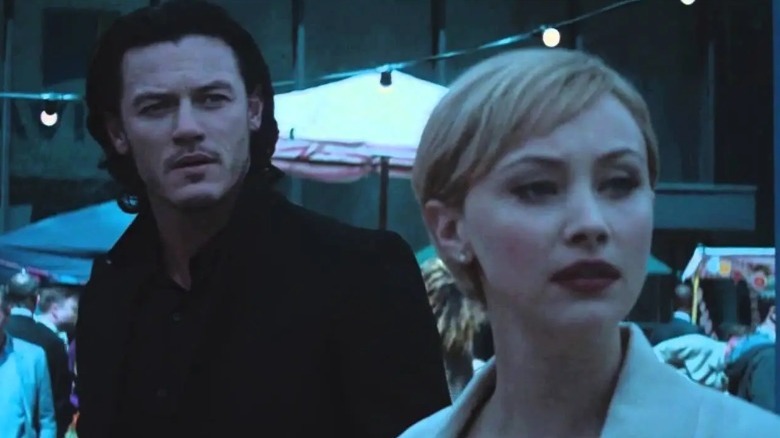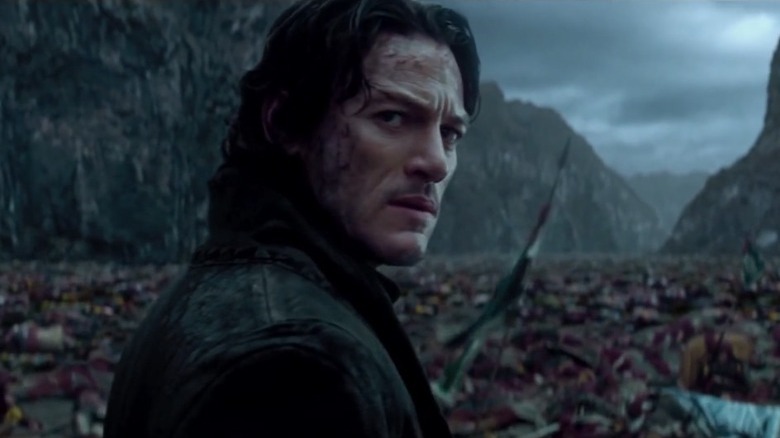The Ending Of Dracula Untold Explained
"My father was a great man. A hero, so they say. Sometimes the world doesn't need another hero; sometimes what it needs is a monster," Vlad (Luke Evans) postulates. Morality isn't always black and white. Often, there's a vast grey area. And in Dracula's case, it's coated red with blood. "Dracula Untold" seeks to rewrite the legend of Dracula by threading in Bram Stoker's original inspiration for the bloodsucking creature of the night. Vlad the Impaler or Vlad III Drăculea, a true-to-life warmonger, led a life of barbarity and bloodshed. But Evans' take on the character suggests that such violent displays were necessary to keep enemies at bay and prevent further carnage. It's the horrors of pain and death that speak to the souls of every man, woman, and child. And Vlad knows this.
Universal Pictures has often attempted to revive the classic monsters that were once so popular during the early half of the 20th century. Most modern efforts have failed commercially. But there's still an air of intrigue surrounding these mythical creatures that have permeated pop culture and influenced some of our favorite television shows, novels, and films in the modern era. Bela Lugosi is often inseparable in our minds from the character of Dracula given his 1931 performance on screen. Since then, however, others have plunged their fangs into the role including Gary Oldman in Francis Ford Coppola's 1992 film, "Bram Stoker's Dracula." No matter which iteration of the character you refer to, Dracula has often been seen as evil incarnate. "Dracula Untold" blurs the lines of good and evil, providing us a more sympathetic view of the monster. For your reading pleasure, we'll take a look at the themes and implications of the narrative behind "Dracula Untold."
The Ottoman conquest
The territories of Transylvania and Wallachia have a long, sordid history. "Dracula Untold" takes place during the 15th century, a period in which Transylvania was Romanian territory that belonged to the Kingdom of Hungary. The film depicts Transylvania as subservient to the Ottoman Empire, primarily the Turks. It was at this time that it was historically a vassal state of the Ottoman Empire. It was a semi-independent kingdom often ruled by Hungarian leaders. The territory was beholden to the Ottoman Empire in terms of tributary offerings, an egregious form of taxation. Offering tribute is depicted in the film.
Historically, it is true that Vlad was held by the court of the Ottoman Sultan when he was a child to ensure his father's loyalty. But this wasn't due to a vassalage accord, but instead a forceful hand by a mounting threat to Wallachia that'd ultimately ensure their leadership would support Ottoman policies. During the time of the Ottoman Sultan Mehmed II (Dominic Cooper), it is also true that he was persistent in his encroachment on Wallachian and Transylvanian territory. While he never demanded Vlad's son (Art Parkinson) as homage like Vlad was once as a child — the film's way of maintaining poetic symmetry — Mehmed II did demand that Vlad pay recompense for skating by for years without tribute. The real-life Vlad killed the men sent to capture him by impaling them and cutting off their noses. Luke Evans' version of the character didn't appear quite so ruthless.
Vlad the Impaler
As a warlord, Vlad no doubt earned his title. Historically, Vlad was angered by the murder of his father and older brother, a heinous crime enacted by Wallachian nobles (via Brittanica). Many of the nobles alongside Vlad's younger brother, Radu, were in league with the Ottoman sultan. Vlad vied for his father's seat over the course of several years. Once he obtained the leadership, he began a ruthless campaign against the Ottomans, barbarically impaling the opposition and leaving them hoisted on spears to bleed out and die. He'd create frightful imagery of death that was meant to act as a deterrent to any pursuers. Vlad was known for his cruelty on the battlefield. Other historical accounts show that he had a penchant for maiming and torturing his enemies (via Historic Mysteries). He was known to boil victims or dismember them while alive. By all modern accounts, he was a pretty bad dude, though some viewed him as a hero for aggressively staving off total Ottoman rule.
The film depicts Vlad in a very different light. While he is shown as the warlord we know from the history books who famously impaled his victims, Luke Evans portrays a man who's crippled with remorse over his past deeds. His only true motivation is to defend his family. He even justified his cruel means of administering death as a way to stave off further bloodshed. This Vlad is far more sympathetic and heroic than any of the history books will ever give the man credit for. His conflict with Mehmed II is simply born out of the threat the sultan poses to his son and the children within the walls of his kingdom.
A deal with the de— a Roman?
Dracula is often depicted as an elusive character. Bram Stoker's novel even writes of his legend as chatter among the locals. Abraham Van Helsing even alleges that a possible deal was struck with the devil that made Dracula who he is. Francis Ford Coppola's famous depiction of the eternally damned vampire depicts his human form, Vlad, renouncing God after his wife commits suicide. He impales a stone crucifix with his sword and drinks the blood gushing from it, ultimately turning him into his vampiric state.
However, "Dracula Untold" relays a different story. Vlad does indeed make a deal with infernal origins, but it is through a mysterious vampire (Charles Dance) who haunts Broken Tooth Mountain just outside of Transylvanian domain. A Roman from the days of the early Roman Empire several centuries prior, he summoned a demon for success and power. While he was granted inhuman abilities and power over man, the demon tricked him by forcing him to remain trapped in his cave until he can one day find another to offer to the darkness. Vlad seeks out the beast and asks for his power. The vampire concedes laying out the rules of the curse. If Vlad fails to resist the urge to drink blood in the span of three days, the vampire of Broken Tooth Mountain will be released from his prison free to roam the Earth. Furthermore, Vlad will remain a vampire for all eternity. But if he resists the temptation, Vlad will return to mortality giving him time to win his war with the Turks and then return to his family. Let's not kid ourselves — before even finishing this movie, we knew what the outcome would be, right?
A utilitarian philosophy
As we've already established, "Dracula Untold" embraces shades of grey as far as moral philosophy is concerned. Vlad, a prince of Wallachia and Transylvania, must determine the best way to protect his people from the encroachment of Turkish invaders. As a leader, this forces Vlad into the position of determining his own code as he forges ahead among kingdoms, empires, and bloodshed. Vlad the Impaler is known historically for his depravity. Given what we know about him, it's likely that he took pleasure in maiming and killing his victims as a form of vindictive rage towards the Ottomans. However, "Dracula Untold" depicts a Vlad whose uncompromising method of cruelty and death is suggested to be his own means of staving off further bloodshed. He tells the ancient vampire of Black Tooth Mountain that he only put one village to the spear in a grisly display in hopes it'd stoke enough fear to save 10 more villages from certain death.
Therefore, the Vlad of "Dracula Untold" embraces a utilitarian philosophy, one that determines results based on the greater good. His nickname as an Impaler was only a result of the prince attempting to cause enough fear in his enemies that they'd stand down despite how grisly and horrific the death sentence actually is for those who suffered from it. Vlad embraces the same ideology when it comes to defending his kingdom from Mehmed. Even if he has to damn his own soul, he'll take the powers that vampirism grants him to aid his kingdom.
The cost of salvation
With great power comes great destruction. Wait, is that not the saying? Well, maybe Uncle Ben got it wrong. Vlad inadvertently trades the lives of countless souls for the power that he obtains. Even if he manages to resist drinking the blood of others, it becomes clear that his reputation is shattered because of his dalliance with darkness. However, his gamble ultimately takes the predictable course given what we know about Dracula. The vampire of Broken Tooth Mountain proclaims that Vlad is as much his salvation as he is for Vlad. This footnote in the contract seems to be an element Vlad dismisses entirely.
If Vlad drinks blood, the vampire of Broken Tooth Mountain will be free of his imprisonment and can roam the Earth at his leisure. We never received a sequel that showed us the full scope of this consequence. However, let's dissect what we know. This vampire was once a man who sought power. His bid for unholy strength was granted at the behest of the underworld. Now, let's imagine what an ancient being who once sought power over man and was tricked by the devil will do once he is set free. No matter how you look at it, his freedom can only spell trouble for many innocent souls. We see Charles Dance's vampire stalking the streets of modern-day society right behind Vlad in the ending of the film, clearly with sinister intent. Vlad's ordeal didn't only directly affect him, but also a beast caged by a demon. Vlad's thoughts were first and foremost on his own kingdom. He failed to realize what was truly at stake with the deal he struck.
The thing about silver
The only way to bring down Superman is with Kryptonite. As a vampire, Dracula is a demonically twisted form of Superman. The film calls out his Kryptonite fairly early in the film when the vampire of Broken Tooth Mountain tells Vlad to hide his silver because it "offends him." Silver has long been a weapon to be wielded against mythical creatures of the night, including werewolves and vampires. This is often tied to the idea that silver was used as payment to Judas Iscariot for his betrayal of Jesus Christ. This religious significance was further discussed in "Dracula 2000" (per CBR). The metal is often seen as a reminder that the creatures are damned eternally just like Christ's betrayer.
Some viewers may not pick up on the fact that Vlad makes use of this weakness for his own benefit. The silver ring that he wears now only brings him pain. But he keeps it close and is seen hovering over it in his own tent during the height of his temptation to drink blood. Vlad is actually using the silver to weaken him and help him resist the urge to drink the blood of another human being. He was insistent toward fulfilling the deal as told by the vampire of Broken Tooth Mountain without the cost of his soul. Of course, Vlad would've actually made it to the finish line if he wasn't forced to require his powers beyond the three-day time limit to save his son.
A world of vampires
We know, right? You can probably hear the Smashing Pumpkins tune buzzing in your head, "The world is a vampire." But no, this is a world of vampires. The legend isn't some far-flung children's bed time story in the age of Vlad, either. In fact, it's the unspoken yet somehow viral knowledge of beings who are spiritually tormented and bloodthirsty. In the early moments of the film, when Vlad tries to understand what attacked him and his men in the cave on Broken Tooth Mountain, a monk (Paul Kaye) unveils all of the documentation necessary to pinpoint the culprit. Despite Vlad asking the monk to keep the knowledge to himself so as to not disturb the people, it seems they're already well aware of the creature of the night.
After Vlad flexes his newfound vampiric muscles, his own people revile him as a demon knowing full well what he is. This indicates that the idea of vampires isn't foreign to the world. Dracula, and even the vampire of Broken Tooth Mountain are not the first creatures of the night as legend would have you believe. When Dracula confronts Mehmed, the sultan already knows how to defend himself against the undead. While vampires might be rare, they've existed long before Vlad came along. In fact, historically, the first tale of a vampire dates back to 1500 B.C. Her name is Sekhmet, and she was a goddess of ancient Egypt (via Oldest.org). While the term "vampire" didn't exist in these times, she'd often be scourge upon humankind as punishment from the gods for mankind's disloyalty. In tales, she is known to slaughter humans and drink their blood. So in the world of "Dracula Untold," vampiric entities were perhaps also of ancient origin.
Exchanging life for damnation
Dracula was never merely Vlad's three-day stint as vampire. Bram Stoker's tale of the undead creature spans centuries. We always knew that something would drive Vlad to drink the blood of the innocent. We just weren't sure what that catalyst would be. After all, he seemed rather convicted in disappointing the vampire of Broken Tooth Mountain proving that he could resist the urge. But even he knew that Vlad would be forced to take hold of the power and live the life of a damned soul.
Ultimately, Mehmed threatens the life of Vlad's son. After his wife (Sarah Gadon) falls to her death, she begs Vlad to drink her blood with her dying breath so that he might have the power to save their son. Essentially, she asks her husband to forfeit his soul and live an eternity in darkness in exchange for saving their son from the Ottomans. That's a hefty price tag to ask a significant other to swallow. But it seems Vlad didn't take long to think it over as he buries himself in her neck and ultimately becomes Dracula, son of the Devil, as he proclaims to Mehmed. It's hard to truthfully reconcile every burden Vlad thrust upon himself in the name of securing his son's physical wellbeing. Not only is he forced to live an eternity among misery and death, but he'll eventually see a time when his son will grow old and pass on. The question will then become, was it worth it? As a parent, the answer is undeniable — especially in the heat of the moment. However, we're talking about eternity in exchange for the temporary. It's almost tragic.
Does becoming a vampire make one inherently evil?
From Bram Stoker's point of view, Dracula is pretty evil. After all, he is a creature that preys on the innocent. Again, "Dracula Untold" endeavors to shine a different light on the character. After Mehmed lays waste to his people, Vlad asks the survivors if they wish for revenge. They agree, and he turns them all into vampires. They then assault Mehmed's army and destroy them. Following the destruction, however, these vampires who were once friends and allies of Vlad prove to be hostile. They suggest that he kill his son and rid himself of the distraction since "other vampires" are now "his people" and should be his sole focus.
Of course, Vlad did everything that he did for his son. So he refuses and uses his powers to part the clouds so that the sun will shine through and burn them all, including himself. But this raises the question — does becoming a vampire make a person evil? The ordinary humans of this world seem to think so. But we've long heard stories of misunderstood monsters that humans had cursed, shunned, or killed impulsively. Could there be an actual decent vampire that sparkles in the sunlight and only drinks the blood of animals? Cheesy "Twilight" references aside, it seems this world postulates that becoming a vampire ultimately turns a person into an outcast who has been separated from their humanity. Vlad's son was seemingly his last tether to humankind. While modern times shows him recognizing and showing kindness toward a woman who bares an uncanny resemblance to his late wife, it's unknown whether he had become a feared monster in this world. But we're betting that he did.
Universal Monsters
Clearly, Universal Pictures has long dreamt of reviving their classic monsters through a magnificent universe akin to the successful Marvel franchise. "Dracula Untold" was supposed to be the start of such a venture. While the film didn't bomb financially, it didn't rake in Marvel numbers either. The movie studio moved on and attempted another revival — a "Dark Universe" — with the Tom Cruise-led "The Mummy" remake. This, however, proved to be a disaster. Still, there are plenty of thoughts about what could have been. After all, the finale scene of the film depicted a modern world in which Dracula is alive and well wandering the streets among average humans. Charles Dance's vampire is lurking in the backdrop and teases fun events yet to come.
Will there be a "Dracula Untold 2"? The idea hasn't been entirely scrapped. However, the prospects remain grim given that Universal has plenty of other monster projects lined up. The studio seemingly abandoned its cinematic universe scheme, dropping follow-up "Dark Universe" films from its schedule and outsourcing an "Invisible Man" film to Blumhouse Productions. Still, the film is slowly building a cult following of fans hoping to see a follow-up someday (via Collider). Universal has never stated that the potential for a sequel is dead. So only time will tell. But given the current schedule over at Universal, we most assuredly won't see anything else from Luke Evans' Dracula in the near future.
